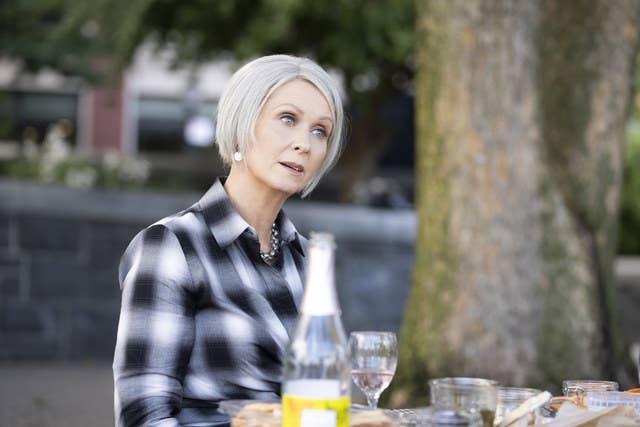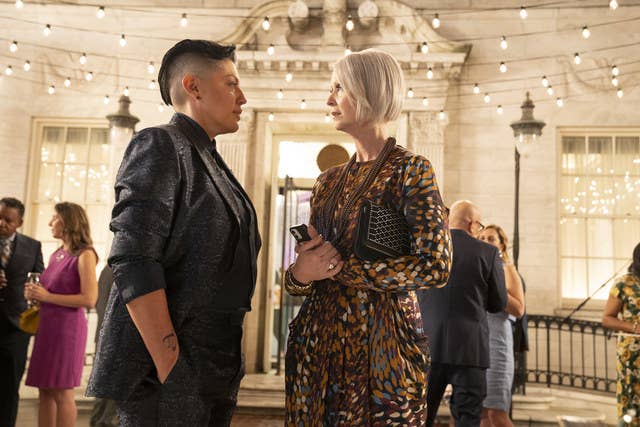
Sex and the City centered on a group of women in their 30s who excelled at being single and fabulous. Twenty years later, the culture has moved on, and in And Just Like That, HBO Max’s quasi reboot (a “revival”), the ladies have had to reckon with their own obsolescence.
Those reckonings have been, for the most part, painful and humiliating, from Charlotte realizing she and Harry have no Black friends to Carrie attempting to reinvent herself in the podcast era. But no one has fared more poorly in her struggle to get with the times than Miranda.
The sarcastic careerist and aughts-era feminist icon who inspired slogan T-shirts, many a Tumblr post, and a book declaring that We Should All Be Mirandas has undergone a significant transformation since we last saw her — some for the better, though mostly for the worse. The former corporate lawyer has seen the tides of social justice rising around her and decided to be the change she wishes to see in the world. And Just Like That begins with Miranda embarking on a master’s degree in human rights (good) and then immediately failing to recognize that her professor, Nya Wallace, is her professor because she’s wearing braids, sending her into a spiral of bizarre racist microaggressions (bad).
Nya (Karen Pittman) is one of four new characters of color assigned to each of the original ladies (plus a floater, as if for Samantha — ugh, god, we miss you, Sam!!) in the reboot’s consistently awkward attempt to atone for the original’s lack of diversity. That attempt has had mixed results: Carrie’s new friend Seema (the dazzling Sarita Choudhury) is pitch-perfect as a sexy, single real estate scion who has gently pushed Carrie on her shit. A friendship that makes far less sense is Miranda’s with Nya, especially after Miranda continues to make clueless racial blunders. It’s pretty hard to believe that someone as smart and poised as Nya would see Miranda as a confidant, because the Miranda of And Just Like That is a trainwreck of epic proportions.
In the original series, Miranda’s bright red hair and signature androgynous style made her a cult fashion icon. She was dryly funny, curt, bossy, cynical, and wise, a prototypical HBIC who refused to get belittled and undermined in the office long before the appeal of the girlboss trope began to lose its luster. She wasn’t just competent; she was brilliant. This new Miranda, meanwhile, is barely savvy enough to navigate basic human interactions. She’s compelled to sit in empty bars at 10 a.m. before class and drink wine before speaking at Big’s funeral, seemingly unable to deal otherwise. Most significantly of all, she’s abandoning her long-term marriage to Steve, one of the original series’ favorite sweethearts, for Che Diaz (Sara Ramirez), many viewers’ least favorite character — not only on the show, mind you, but in all of current television.

We’ve now seen the infamous Che perform in a number of “comedy concerts” (??) that seem more like the work of a self-help influencer than, you know, a comic. They pull out their weed pipe at various inappropriate moments: in an elevator, for a teenager, after making Miranda see the face of Gay God with the use of a single finger in Carrie’s kitchen. Perhaps worst of all, they failed to check their Instagram DMs for weeks after explicitly telling Miranda, now an emotionally fragile middle-aged woman who’s just had her first queer sexual experience, to “DM me if you wanna chill again soon, OK?” because — why else — they’d been “doing a lot of weed.”
Che is, indeed, an annoying and eminently memeable character. But their cringiness serves only to highlight how far the mighty Miranda has fallen. (“I was cravin’ me some Che” is maybe the worst line in the whole series, which is saying something.)
She wasn’t just competent; she was brilliant. This new Miranda, meanwhile, is barely savvy enough to navigate basic human interactions.
Miranda’s queer awakening in itself, to be clear, isn’t the problem here. Lots of fans have suspected that our favorite short-haired business bitch might be into people of different genders, not least because Cynthia Nixon, who brings her to life, is queer IRL. What’s been so uncomfortable and, at times, completely maddening to watch is how exactly that awakening has been executed.
As Alison Stine recently argued at Salon, Miranda’s belated coming-out has been met with bizarrely antiquated and not-so-subtly anti-queer pushback within the world of the show. When she admits to Charlotte that she had sex with Che in Carrie’s kitchen, it’s not the fact of Miranda’s extramarital affair that concerns her, or that Carrie was forced to listen in, but the apparent problem of Che’s nonbinary identity: “You’re not progressive enough for this,” Charlotte tells her.
Of course, characters can have anti-queer attitudes without those attitudes being endorsed by the show at large. I actually laughed at that Charlotte line — it did seem like something she would say.
After that moment, though, nearly everything about Miranda and Che’s whole deal becomes incomprehensible. On the one hand, it makes total sense on Miranda’s part that she would be fanatical about the person who awakened her queerness; most of us have been there and done that. It can be really hard to conceive of a whole queer world out there that will offer you far more mind-blowing experiences than your first non-hetero hookup; for many first-timers, the prospect of losing your entryway into queerness can feel like losing queer possibility altogether. (Miranda screaming “this HAS to work!!” at Che in their apartment stairwell, when she thought they were breaking up with her, is a fine example of this kind of baby gay panic.)
But while it’s one thing for Miranda to insist that she and Che make it as a couple, it’s quite another for the show to indulge her. At the end of Episode 8, immediately after Miranda breaks up with poor, undeserving Steve, Carrie is alarmed to hear that her quickly unraveling friend has jumped into a cab on the way to the airport, where she plans to fly to Cleveland and surprise Che at their show there. She’d then deliver the news: They can finally be together! I eagerly awaited the next episode, in which, I was positive, Che would be horrified at Miranda’s grand romantic gesture and especially disturbed to learn that she’d left a whole-ass marriage for someone she isn’t even dating. After all, earlier in the season, Che ghosts Miranda out of stoned indifference, and later they assure Miranda that she isn’t even their girlfriend — they’re just “getting to know each other.” I assumed this was going to be Miranda’s rock bottom, and I was genuinely excited to see how her character, following her first queer heartbreak, would finally have to reckon with herself and the woman she wants to be in this next chapter of her life.
Instead, the rest of the season rolls right along without even mentioning whatever happened in Cleveland. Inexcusable!
Perhaps Miranda’s rude awakening is forthcoming. And Just Like That was reportedly HBO Max’s most successful original series to date, and showrunner Michael Patrick King is eager to make more episodes. Miranda has abandoned a prestigious legal internship that Nya worked hard to place her in so she can go sit around in Los Angeles while Che is shooting their pilot. This seems like a recipe for disaster, but so have many of Miranda’s moves so far, which have yet to really blow up in her face.
When looking back on these 10 chaotic episodes, I think the thing that annoys me most of all is the extent to which we’re supposed to think that Miranda is blowing her life up for Che specifically, rather than queerness and/or adventure more generally. In Episode 9, Steve asks Carrie whether Miranda always wanted to be with women, and she reports that Miranda has always told her this whole thing isn’t about gender or sexuality at all: “It’s not about being with women. It’s about being with Che.”
Che is not a woman, but we get the idea here: Miranda isn’t supposed to be going through a queer awakening, but merely a Che awakening. It’s a bizarrely regressive framing, one that, were Che a better-written character, they’d surely hate: You can’t divorce someone from their gender or their sexuality. We’ve all known someone who’s insisted that they aren’t gay, or queer or bi or anything messy and complicated like that, but simply in love with one person, one exception. It’s an attitude rooted in obvious internalized homophobia, one that the show is failing to question if not outright endorsing. Clearly I’m not a Che fan, but they deserve better than that. So does Miranda. And queer viewers do too. ●
